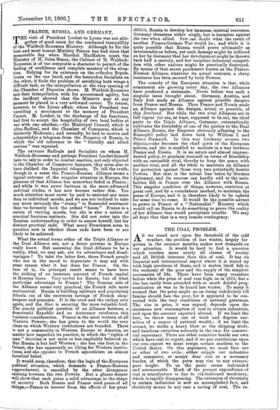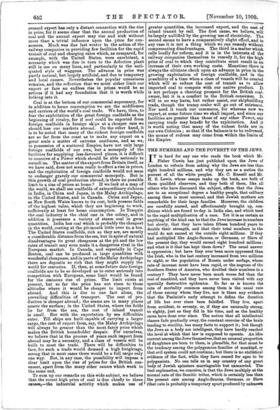THE COAL PROBLEM.
IS we stand now upon the threshold of the cold weather, the problem of last winter, largely for gotten in the summer months, makes new demands on our attention. It would be hard to find a question which touches more nearly all classes of society and all British interests than this of coal. It has its Imperial and international aspect where it is mixed up with high questions of State, and it makes itself felt in the economy of the poor and the supply of the simplest necessaries of life. There have been many occasions before when the price of coal rose high, as in 1873, but a rise has rarely been attended with so much doleful prog- nostication as was to be heard last winter. To many it seemed that the price might go on rising indefinitely till famine should face the poor, for it appeared to be con- nected with the very conditions of national greatness. The rise in price, it was argued, depends upon the enormous new consumption of coal in certain industries, and upon the amount exported abroad. If we limit the first, we throw many out of work and deprive our- selves of a source of national wealth ; if we limit the second, we strike a heavy blow at the shipping trade, and handicap ourselves seriously in the race for commer- cial supremacy. There are other countries beside our own which have coal to export, and if we put restrictions upon our own export we must resign certain markets to the United States. On this argument, we must face one or other of two evils : either cripple our industries and commerce, or accept dear coal as a necessary burden of which the price may rise to any extrava- gant height. To us the panic seems unfounded and unreasonable. Much of the present expenditure of coal in manufacture is due to old-fashioned machinery, which is rapidly disappearing. The extension of electricity to certain industries is now an accomplished fact, and electricity means in any case a saving of coal. The in- creased export has only a distant connection with the rise in price, for it seems clear that the annual production of coal and the annual export may rise and sink without more than a trivial influence upon the price for con- sumers. Much was due last winter to the action of the railway companies in providing few facilities for the rapid transit of coal and charging rates which, as compared, for example, with the United States, were exorbitant, a necessity which was due in turn to the defective plant still in use on many lines, and particularly to the anti- quated style of waggons. The advance in price was partly natural, but largely artificial, and due to temporary and local causes. Nevertheless the popular uneasiness remains, and the reflection that we must either limit our export or face an endless rise in prices would be so serious if it had any foundation that it is worth while looking into it.
Coal is at the bottom of our commercial supremacy, for in addition to home consumption we are the middlemen and carriers of the world's coal trade. We have, then, to fear the exploitation of the great foreign coalfields as the beginning of rivalry, for if coal could be exported from foreign coalfields in foreign ships at a cheaper rate we should lose our markets abroad. On the other hand, it is to be noted that many of the richest foreign coalfields are so far from the coast as to make any export on a great scale a matter of extreme costliness, and as we, in possession of a scattered Empire, have not only large foreign coalfields of our own, but a monopoly of the facilities for supplying less-favoured places, it is difficult to conceive of a Power which should be able seriously to outsell us. The matter of the export from Britain itself, as we have said, does not seem really to effect a rise in prices, and the exploitation of foreign coalfields would not seem to endanger gravely our commercial monopoly. But in this growth of coal production abroad, is there no possible limit to a rise of prices at home ? If we look at a map of the world, we shall see coalfields of extraordinary richness in India in China and Japan, in the Malay Archipelago, in the United States, and in Canada. China and Japan, as New South Wales knows to its cost, both possess fields or the highest value, which they are beginning to work, sufficiently at least for home consumption. In Tonquin the coal industry is the chief one in the colony, and in addition it possesses a variety of steam coal in great quantities. India has coal which is probably the cheapest in the world, costing at the pit-mouth little over 4s. a ton. The United States coalfields, rich as they are, are mostly a considerable distance from the sea, but in spite of natural disadvantages its great cheapness at the pit and the low rates of transit may soon make it a dangerous rival in the European market. In Canada, and especially in Cape Breton, coal can be produced in large quantities with wonderful cheapness, and in parts of the Malay Archipelago there are deposits so rich that they might supply the world for centuries. If, then, at some future date foreign coalfields are to be so developed as to enter seriously into competition with European, some limit would be found for the ominous rise of prices. The limit exists at present, but so far the price has not risen to those altitudes where it would be cheaper to import from abroad. And this is due to one fact alone, the prevailing difficulties of transport. The cost of pro- duction is cheaper abroad ; the seams are in many places nearer the surface; in the United States, where the fields lie far from the sea, the cost of inland transit is small. But with the exportation by sea difficulties enter. Till ships are built capable of carrying a larger cargo, the cost of export from, say, the Malay Archipelago will always be greater than the most fancy price which makes the British householder despair. For ourselves, we believe that in the process of years such import from abroad may be a necessity, and a class of vessels will be built to meet the trade. There will be difficulties to face, for such a trade would demand a high freightage, seeing that in most cases there would be a full cargo only one way. But, in any case, the possibility will impose a clear limit upon the rise of prices for the British con- sumer, apart from the many other causes which work to the same end.
To sum up our remarks on this wide subject, we believe that the recent high price of coal is due chiefly to three causes,—the industrial activity which makes use of greater quantities, the increased export, and the cost of inland transit by rail. The first cause, we believe, will be largely nullified by the growing use of electricity. The second seems to have a comparatively slight effect, and in any case it is not a thing which we can remedy without compensating disadvantages. The third is a matter which calls loudly for reform, and it is in the interests of the railway companies themselves to remedy it, for the high price of coal to which they contribute must result in an increase of their own working costs. Meantime there is always the ultimate check upon an advance in price in the growing exploitation of foreign coalfields, and in the possibility of a time when a class of vessels will be created which will so reduce the cost of transit as to allow imported coal to compete with our native product. It is not perhaps a cheering prospect for the British coal- owner, but it is a comfort to the British consumer. It will in no way harm, but rather assist, our shipbuilding trade, though the tramp coaler will go ont of existence. Nor need it touch our commerce, for whereas now we export, at some future time we shall import, and since our facilities are greater than those of any other Power, our carrying trade may benefit by the exploitation. And it is worth noting that many of the richest fields are in our own Colonies ; so that if the balance is to be redressed, the means of redress may come from within the limits of the Empire.







































 Previous page
Previous page